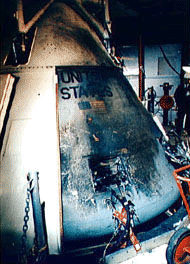
 |
| Apollo 1 astronauts Ed White, Gus Grissom, and Roger Chaffee (NASA) |
 |
| The Apollo 1 capsule after the fire (NASA) |
Race to the Moon
It is 1961 and the Soviet Union has just launched the first man into space. President Kennedy responds by saying, "I believe that this nation should commit itself to achieving the goal, before this decade is out, of landing a man on the moon and returning him safely to Earth."Kennedy wants to show that America can defeat the Soviet Union in the space race. Both countries are sworn enemies fighting the Cold War, which will last for decades. Between 1963 and 1965, the Soviets launch the first woman and the first three-man crew, and do the first space walk. But the U.S. remains confident it can meet Kennedy's challenge.
Then, tragedy strikes. On January 27, 1967, the crew of Apollo 1 — Virgil "Gus" Grissom, Edward White II, and Roger Chaffee — are killed in a fire on the launchpad. On April 23, the Soviets experience the death of a cosmonaut when his spacecraft's re-entry parachute fails.
Both space programs halt flights for a year. By the time NASA restarts its space program, the Soviets already have their next missions underway. Unlike the Americans, the Soviets work in secret. Are they planning a manned moon mission next?



